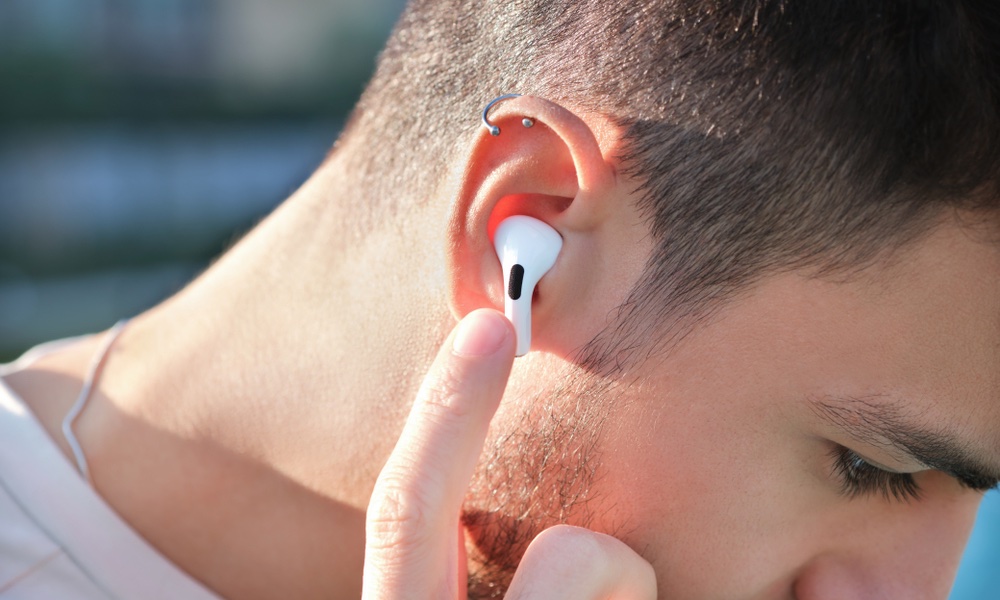Next Year’s AirPods May Include Heart Rate and Blood Oxygen Sensors
 Credit: Yasar Turanli / Shutterstock
Credit: Yasar Turanli / Shutterstock
Toggle Dark Mode
Although it doesn’t sound like we’re going to see any new versions of Apple’s traditional AirPods this year, that doesn’t mean that Apple isn’t actively working on the next big thing for its insanely popular true wireless earbuds.
While we’ve been hearing lots of different reports of Apple’s plans for AirPods over the past few months, these have all gelled into a pretty clear picture of Apple’s timeline more recently, with reliable reports saying that we won’t see third-generation AirPods until at least 2021, and new AirPods Pro could be even farther out. Further, while we heard some rumours of an “AirPods Pro Lite” new information suggests that these may actually be a new Beats product, such as an update to the BeatsX wireless earphones.
In fact, about the only “AirPods” product we’re likely to see this year is Apple’s “AirPods Studio” over-ear headphones, which are reported to be in production already and could be unveiled as soon as next month.
What’s Next for AirPods
When you think about it, the lack of new AirPods shouldn’t be all that surprising, really. Unlike products such as the iPhone, where new upgrades are expected year-over-year to keep up with technology, Apple has never had a need to update its AirPods to keep them current, with the original 2016 AirPods still flying off the shelves two years after they were released.
So Apple isn’t about to release a new set of AirPods just for the sake of cranking out a new version each year; updated AirPods are going to have to offer something pretty significant to be worthy of a new version. In the case of the original AirPods, the was wireless charging capabilities and “Hey Siri” support, which took over two years to arrive, and then of course came the AirPods Pro later last year with a new in-ear design and Active Noise Cancellation.
So where does Apple go from here?
Well, considering that we’ve been hearing rumours since at least 2018 of Apple working on some pretty significant new health-monitoring features, if anything last year’s second-generation AirPods and AirPods Pro may have been a bit underwhelming, and it stands to reason that Apple still has more ambitious plans in store for the AirPods. In Apple’s usual fashion, it’s probably taking its time to develop these features properly, however, as its one thing to cram reliable health sensors into a watch, but quite another to get them to fit into something as small as an AirPod.
We actually haven’t heard much about AirPods health sensors in a while, but a new report from DigiTimes reveals that Apple’s AirPods are still very much a part of its health technology plans.
Ambient Light Sensors
According to the report, which was shared by MacRumors, Apple is looking into integrating ambient light sensors (ALS) into a new model of AirPods “in the next couple of years,” to be produced by Taiwan’s ASE Technology, the same company that’s also reportedly building antenna-in-package (AiP) modules for Apple’s mmWave 5G iPhones and iPads.
According to DigiTimes, ASE Technology’s sensors would allow the devices to “monitor heart rates, step counts and health conditions and even to conduct intelligent translation and detect head motions.”
As MacRumors explains, fingertip pulse oximeters, which are used to measure blood oxygen levels, work by shining red and infrared light through the wearer’s blood vessels, and hospital ear-based clip-on pulse oximeters do the same with an earlobe. So it’s not a stretch at all to see how Apple could be working on embedding the same type of sensor into a future version of its AirPods.
What could be more ambitious about Apple’s plans would be to make this work with an in-ear design. In fact, Apple wouldn’t be the first to make true wireless earphones with built-in heart sensors — another company, FreeWavz, has already done this, demonstrating that Apple could easily build the sensors into something like the Powerbeats Pro, but knowing Apple, it wants to break new ground here rather than simply copying what somebody else has already done. Further, Apple sees health care as a primary focus, which makes it likely that it would want to bring these features to its flagship Apple-branded products, rather than relegating them to its Beats brand.
To be clear, DigiTimes has a mixed track record when it comes to predicting what Apple is up to; it has a lot of contacts within Apple’s Asian supply chain that provide it with accurate details, but it’s often hard to interpret those puzzle pieces to figure out what Apple is actually up to.
For example, it was DigiTimes who predicted last year that Apple’s AirPods 2 would have health monitoring features by last summer, which of course didn’t happen with either of the second-generation AirPods nor the AirPods Pro last year, but that doesn’t mean that Apple wasn’t working on the technology, just that it may have either held it back, or it may have never planned to include it in the 2019 AirPods models in the first place. Apple often lines up its supply chain years in advance of its products to ensure that it will be able to produce at scale when the time comes, and this kind of logistical planning is even more important considering the extremely high demand for AirPods.
So at this point, we don’t even know if this is something Apple has lined up for next year’s AirPods, or is still a longer-term project, but considering how little room there is for anything more than incremental improvements in Apple’s AirPods, it definitely seems like health sensors will be the next big thing to come.
[The information provided in this article has NOT been confirmed by Apple and may be speculation. Provided details may not be factual. Take all rumors, tech or otherwise, with a grain of salt.]






